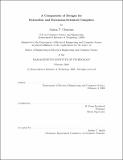A comparison of designs for extensible and extension-oriented compilers
Author(s)
Clements, Austin T., S.M. Massachusetts Institute of Technology
DownloadFull printable version (345.0Kb)
Other Contributors
Massachusetts Institute of Technology. Dept. of Electrical Engineering and Computer Science.
Advisor
M. Frans Kaashoek.
Terms of use
Metadata
Show full item recordAbstract
Today's system programmers go to great lengths to extend the languages in which they program. For instance, system-specific compilers and errors in Linux and other systems, and add support for specialized control flow to Qt and event-based programs. These compilers are difficult to build and cannot always understand each other's language changes. However, they can greatly improve code understandability and correctness, advantages that should be accessible to all programmers. This thesis considers four extensible and extension-oriented compilers: CIL, Polyglot, xtc, and Xoc. These four compilers represent four distinctly different approaches to the problem of bridging the gap between language design and system implementation. Taking an extension author's point of view, this thesis compares the design of each compiler's extension interface in terms of extension structure, syntactic analysis, semantic analysis, and rewriting. To perform the comparison, this thesis uses three extensions implemented variously in the four compilers: a bitwise rotation operator, function expressions, and lock checking. These extensions are designed to span a representative space of analysis and rewriting needs. (cont.) Based on this comparison, this thesis identities the following implications of the design decisions of each extension interface: the expressiveness, understandability, and correctness of extension implementations can benefit from domain specific languages and language features tailored to the extension interface; compiler-managed scheduling trades loss of control for automatic extension composability; unifying internal and external program representation improves ease of use and extension composability, but gives up potentially useful control over the internal representation; concrete syntax patterns provide a natural interface to internal program representation, but must be more powerful than simple tree matching to be practical; grammars, types, and syntax interfaces have a natural correspondence; and accounting for semantic information in the final output enables hygienic rewriting, which can simplify extensions.
Description
Thesis (M. Eng.)--Massachusetts Institute of Technology, Dept. of Electrical Engineering and Computer Science, 2008. This electronic version was submitted by the student author. The certified thesis is available in the Institute Archives and Special Collections. Includes bibliographical references (p. 67-69).
Date issued
2008Department
Massachusetts Institute of Technology. Department of Electrical Engineering and Computer SciencePublisher
Massachusetts Institute of Technology
Keywords
Electrical Engineering and Computer Science.